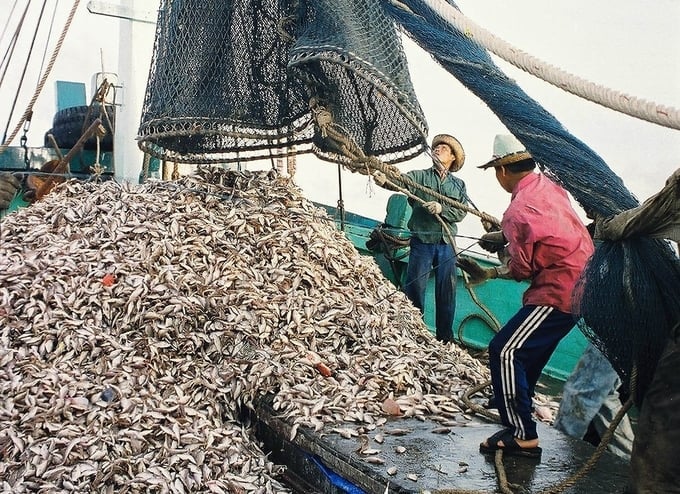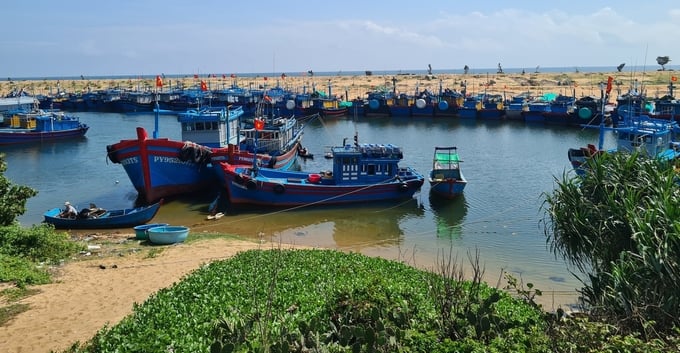June 19, 2025 | 00:33 GMT +7
June 19, 2025 | 00:33 GMT +7
Hotline: 0913.378.918
June 19, 2025 | 00:33 GMT +7
Hotline: 0913.378.918
The government issued Resolution No. 52/NQ-CP on April 22, 2024, detailing the Action Program and Plan for implementing Directive No. 32-CT/TW issued by the Central Party Committee on April 10, 2024 on enhancing the Party's leadership in anti-IUU (illegal, unreported, and unregulated) fishing efforts and promoting sustainable development of the fisheries sector.
The Action Program aims to identify the objectives, tasks, and solutions for effectively implementing Directive No. 32-CT/TW issued by the Central Party Committee on April 10, 2024 on enhancing the Party's leadership in anti-IUU (illegal, unreported, and unregulated) fishing efforts and promoting sustainable development of the fisheries sector. The Government will employ urgent measures to address the limitations and challenges in fisheries management, development, and anti-IUU fishing efforts; ensure the effective implementation of the Party's Resolutions and Directives on Vietnam's Sustainable Marine Economy Development Strategy until 2030, with a vision towards 2045. Furthermore, the Program highlights relevant national plans, strategies, and programs concerning sustainable development and international integration in the fisheries sector.

The long-term tasks and solutions involve urgently reviewing and improving policies and laws in the fisheries sector, with a focus on policies for aquaculture, exploitation, conservation, development of fisheries resources, and preservation and processing to support export. Photo: Hong Tham.
The Program will promote a significant shift in awareness regarding the role and importance of anti-IUU fishing, thereby encouraging stakeholders across all levels and sectors to take action in anti-IUU fishing; enhancing state management capacity and international cooperation in anti-IUU fishing efforts; urgently addressing existing limitations and challenges in anti-IUU fishing; etc.
In this regard, it is important to acknowledge that anti-IUU fishing is an urgent and important task with long-term significance for the sustainable development of Vietnam's fisheries sector. Additionally, it is the shared responsibility of the government and society. Party committees, party organizations, and all levels of leadership across different sectors and regions are directly responsible for leading, guiding, and fostering unity and motivation to remove the IUU "yellow card" in 2024 and maintaining sustainable results. Consequently, this Program aims to improve Vietnam's political and diplomatic relations, international stature, and socioeconomic development in addition to safeguarding its maritime sovereignty.
The program outlines several tasks and solutions until May 2024, including:
Enhancing the effectiveness of information dissemination, training, and mobilization efforts to raise awareness and a sense of responsibility regarding IUU exploitation; improving relevant legal regulations concerning IUU exploitation.
Coordinating and rigorously enforcing fisheries laws in managing fishing fleets, controlling fishing activities at sea and in ports, ensuring compliance with legal provisions.
Implementing Vietnamese and international legal regulations on the identification, certification, and origin traceability of harvested seafood products; preventing the export of illegally harvested seafood products.
Investigating, verifying, and addressing IUU fishing activities in an unbiased and comprehensive manner; preventing and eliminating illegal exploitation activities in international waters.
Regarding international cooperation:
Enhancing international cooperation effectiveness, with a focus on EU countries, regarding anti-IUU fishing and sustainable development of the fisheries sector; strengthening diplomatic measures and leveraging support from international partners to promptly remove the IUU 'yellow card'; preventing the illegal exploitation activities of Vietnamese fishing vessels and fishermen in international waters from affecting Vietnam's international relations.
Actively acquiring information on arrested and processing Vietnamese fishing vessels and fishermen; Compiling records, documents, evidence, judgments, and decisions to investigate, process and protect Vietnamese citizens; Employing diplomatic measures in a timely manner to assist Vietnamese fishing vessels and fishermen detained by foreign authorities in overlapping, disputed or non-delineated waters.
Regarding resource allocation and inspection, examination, and control:
Prioritizing and allocating sufficient resources (personnel, forces, budget, equipment, and means) to local departments and authorities; reinforcing manpower and resources to carry out law enforcement duties; performing patrol, inspection, control, and monitor for the implementation of anti-IUU fishing regulations. Conducting regular inspections, reviewing responsibilities, and strictly penalizing organizations and individuals failing to fulfill their assigned duties.
Long-term tasks and solutions involve urgently reviewing and improving policies and laws in the fisheries sector, with a focus on policies for aquaculture, exploitation, conservation, development of fisheries resources, and preservation and processing to support export. Establishing policies to support modernization of the fisheries sector, thereby enhancing livelihoods, providing vocational training, facilitating fishermen's activities at sea and shore, improving living standards, and guiding fisheries labor management in compliance with domestic and international labor laws.

The government will implement measures to support occupational transition, develop sustainable industries, promote mariculture, and reduce fishermen's dependency on fisheries exploitation. Photo: Hong Tham.
Reviewing, studying, and providing consultations on jurisdiction in administrative penalties pertaining to the fisheries sector for the heads of the Departments of Agriculture and Rural Development with state management capacity in the fisheries sector, or bear fisheries surveillance responsibility. This task is aimed at assisting stakeholders during the process of drafting, amending, and supplementing decrees on the implementation of the Law on Handling Administrative Violations. Consequently, the Program will ensure that relevant authorities have sufficient jurisdiction to enforce fisheries and anti-IUU fishing regulations.
Investing state resources, promoting socialization and public-private partnerships in developing fisheries infrastructure and technical facilities; enhancing the capacity and responsibility of fisheries surveillance forces and fisheries management agencies, thereby supporting law enforcement forces at sea in their anti-IUU efforts. Implementing measures to support occupational transition, develop sustainable industries, promote mariculture, and reduce fishermen's dependency on fisheries exploitation; maintaining a balance between the number of fishing vessel, fishing capacity and the fisheries resources within a marine area.
Promoting industrialization, modernization, application of scientific and technological advancements, innovations, and digital transformation in aquaculture, fisheries exploitation; establishing sustainable production chains, comprehensive ecosystems; creating a conducive environment for the long-term development of the fisheries sector towards circular economy, green economy, emission reduction, credibility, high competitiveness, integration into global supply chains, climate change resilience, and environmental friendliness. Focusing on the conservation, protection, and development of fisheries resources; promoting development of the fisheries sector in association with social security, sustainable livelihoods, and improving the quality of life for fishermen and related workers; reinforcing national defense and security at sea, thereby contributing to the protection of Vietnam's maritime sovereignty.
Enhancing international cooperation in the fisheries sector; assigning fishing vessels and fishermen for legal exploitation activities outside Vietnamese waters; negotiating and delineating economic exclusive zones and continental shelves between Vietnam and other countries; resolving maritime disputes; performing search and rescue duties to ensure the safety of fishermen operating at sea; performing Vietnam's responsibilities in fulfilling international commitments and agreements on the protection of the ocean environment, the marine ecosystem, and fisheries resources.
Implementing national plans, strategies and programs related to sustainable development and international integration of the fisheries sector; implementing the Party's Resolution on Vietnam's Sustainable Marine Economy Development Strategy until 2030, with a vision towards 2045.
Translated by Nguyen Hai Long

(VAN) After 5 years of implementation, the CAI initiative has helped coffee growers change their farming practices, moving toward responsible agriculture that meets global export standards.

(VAN) The primary prerequisite for the comprehensive and robust integration of Vietnam's livestock sector into the global value chain is the establishment of a disease control system.

(VAN) The results of national programs are essential for establishing a contemporary livestock sector that is well-equipped to meet the demands of both domestic and international markets, with robust biosafety standards.

(VAN) The UNESCO Global Geopark revalidation of Non nuoc Cao Bang and the transition to a two-tier administrative model are presently undergoing a pivotal moment in Cao Bang, the northernmost province of Vietnam.
/2025/06/13/5330-2-004539_953.jpg)
(VAN) Changing policy mindset and removing investment barriers are urgent requirements to open up new development space for enterprises in the agricultural sector.

(VAN) The areas include the restoration of five million hectares of marine ecosystems.

(VAN) Dr. Le Van Nguyen, Director of the Institute of E-Commerce Management (ECM), emphasizes the potential for green development through the cultivation of fruit trees, particularly in provinces such as Son La.